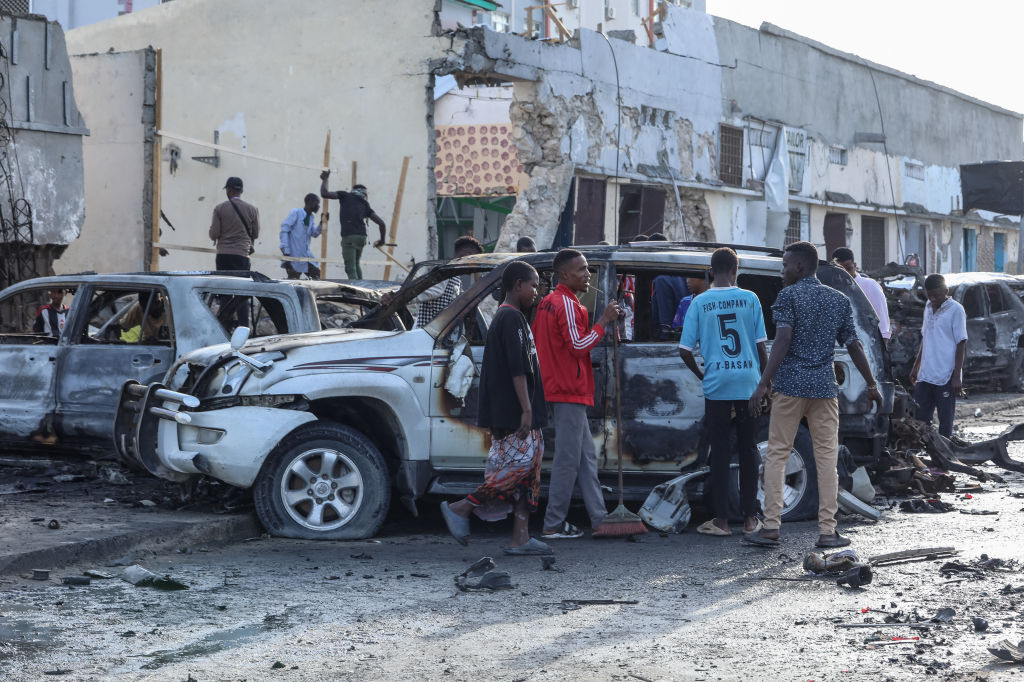Somali President Hassan Sheikh Mohamud was en route to Mogadishu International Airport on March 18 when al-Shabaab militants launched a bomb attack on his convoy.
Mohamud was uninjured and continued his trip to join troops on the frontlines in Hirshabelle State, but the militants killed at least four civilians near a heavily fortified area of Mogadishu.
“With the unity of our people and the support of our international partners, we will secure lasting peace and stability for Somalia,” the country’s Information Ministry said afterword.
The brazen attack came eight days after Abdisalam Guled, former deputy director of Somalia’s National Intelligence and Security Agency (NISA), warned of al-Shabaab’s growing threat. Al-Shabaab also tried to assassinate Mohamud during his first term as president in 2014, when the group bombed a hotel where he was speaking.
Guled told Somali news website Hiiran Online the group was shifting its methods to gain public trust while strengthening its positions in central and southern Somalia, particularly in Hirshabelle. Guled said al-Shabaab threatens Somalia’s sovereignty and aims to establish its own governing authority.
“They’re trying to do what the Taliban did in Afghanistan,” Guled told the website. He also urged the government to assure civilians that its efforts against the al-Qaida-linked terror organization are effective and ongoing.
Adam Daud Ahmed, a political and security analyst in the Horn of Africa, warned that al-Shabaab is no longer launching sporadic attacks but capturing strategic towns and moving closer to Mogadishu.
“For years, Al-Shabaab was defined by its ruthless bombings and assassinations, but something has changed,” Ahmed wrote on Ethiopia’s Addis Standard news website. “This is no longer just a terrorist insurgency; it is an alternative government in the making.”
Al-Shabaab is enforcing Islamic law, collecting taxes, and providing security in areas it controls. It has shifted from mainly targeting civilians in its efforts to seize Mogadishu. Ahmed also said that internal corruption has weakened the military’s counterterrorism efforts while the government is consumed by power struggles and political infighting.
“If Mogadishu falls, the consequences will reverberate far beyond Somalia’s borders,” Ahmed wrote. “Kenya, already a victim of deadly Al-Shabaab attacks, will likely see a new wave of violence along its northeastern border.”
On March 23, insurgents attacked a base in northeast Kenya, killing six police officers and injuring four. No group claimed responsibility, but Garissa County Commissioner Mohamed Mwabudzo told the BBC the style of the attack followed a pattern of raids by al-Shabaab.
Mwabudzo said the attack’s “guerrilla-style” aligned with the group’s “pattern of cross-border raids aimed at destabilizing the region.”
“The suspected militia used assorted weapons to overrun the camp,” he said.
Despite significant setbacks in recent years, including the loss of territory, al-Shabaab has proved its ability to adapt and recruit new fighters. It is particularly lethal in rural areas and along key trade routes leading into Mogadishu.
Somali forces have had some recent success against the group. On March 21, the Somali Air Force in coordination with NISA killed 82 al-Shabaab terrorists and wounded 19 in airstrikes in the Lower Shabelle region.
“These operations to neutralize the terrorists came after the National Intelligence and Security Agency received information about a group of Khawarij who tried to disrupt security in the Sabiid and Canoole areas,” NISA said. Khawarij is a term the Somali government uses to describe al-Shabaab.
Somali forces launched the operation after al-Shabaab conducted predawn attacks near the strategic agricultural town of Afgoye, about 30 kilometers southwest of Mogadishu. Terrorists also launched a mortar attack on February 27, hours after Ethiopian Prime Minister Abiy Ahmed arrived for a diplomatic visit.
“This shows that even with maximum security, Mogadishu is too dangerous for foreign leaders,” Ahmed wrote.

